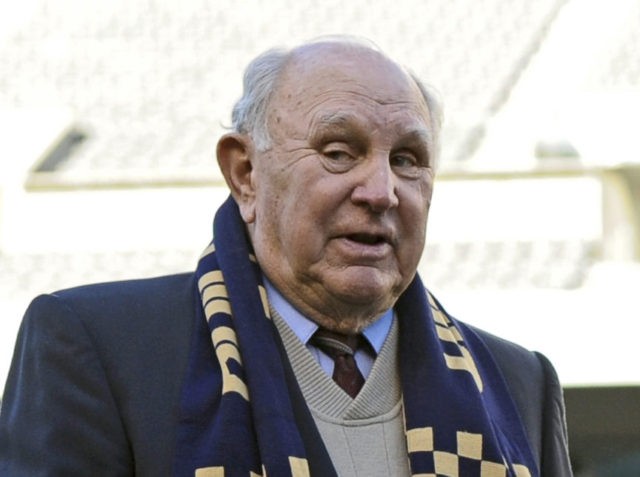When Walter Bahr walked off the field in Brazil after the famous United States victory over England at the 1950 World Cup, he didn’t expect to become a soccer celebrity.
Known for many years as the father of two NFL placekickers, Bahr regained prominence in his own right when the Americans returned to soccer’s showcase in 1990 after a 40-year-absence.
The last living player from that 1950 team, Bahr died Monday in Boalsburg, Pennsylvania, according to granddaughter Lindsey D. Bahr, a film writer for The Associated Press. His death was caused by complications that resulted from a broken hip.
“I say the older I get, the more famous I become,” Bahr told the AP in 2010. “I wasn’t for famous for 50 years.”
A team of soccer unknowns, the U.S. won 1-0 over an England side that included Alf Ramsey and Tom Finney, who earned knighthoods.
“Walter Bahr was one of the greatest people to ever be part of soccer in the United States,” former U.S. Soccer Federation President Sunil Gulati said. “Not only was he a pioneer and a fantastic ambassador for our game over many years, he was a true gentleman.”
Bahr and his teammates were portrayed in the 2005 movie “The Game of Their Lives.”
“A true legend in soccer in the United States,” USSF President Carlos Cordeiro said. “His contribution to one of the most iconic moments in U.S. soccer history was only part of a lifetime of selfless contributions to the game. As a coach, a mentor, a friend, and a colleague, Walter touched the lives of so many people in our sport, ensuring a legacy that will last for generations.”
Quick with a story, a laugh and a smile, Bahr started all three U.S. matches at the 1950 World Cup. A defender who scored one goal in 19 international appearances, made his international debut in a World Cup qualifier against Cuba in 1949, joining a national team that had lost its seven previous international matches by a combined 45-2. The Americans tied Cuba 1-1 in his debut, lost to Mexico, then beat Cuba as Bahr scored and earned a trip to the 1950 tournament in Brazil.
The U.S. wasted a late lead to Spain in its opener and lost 3-1. England was coming off a win over Chile.
“We knew we weren’t in the same class as the English team,” Bahr said. “But anybody worth their salt when they go out onto the field, they always think there’s some possibility that something can happen, that they could steal a victory.”
In the match at Belo Horizonte on June 29, 1950, Bahr collected a throw-in from Ed McIlvenny and took a shot from about 25 yards that Joe Gaetjens deflected past goalkeeper Bert Williams with a diving header late in the first half. Frank Borghi had some spectacular saves that made the lead stand up.
“As much as we were very thrilled and pleased to win the game, most of us felt the same way: ‘How’s that English club going to go back home and face their fans?'” Bahr said. “It was a lot easier for us to explain the victory than for them to go back and explain that defeat.”
Born on April 1, 1927, Bahr was a graduate of Temple University and part of the 1948 U.S. Olympic team. He coached Temple from 1970-73 and Penn State from 1974-88, leading the Nittany Lions to the NCAA semifinals in 1979, when he was United Soccer Coaches College Coach of the Year.
He is survived by his wife 71 years, the former Davies Uhler; daughter Davies Ann Desiderio, and sons Matt, Chris, and Casey. All three sons played professional soccer, and Matt and Chris won Super Bowls.

COMMENTS
Please let us know if you're having issues with commenting.